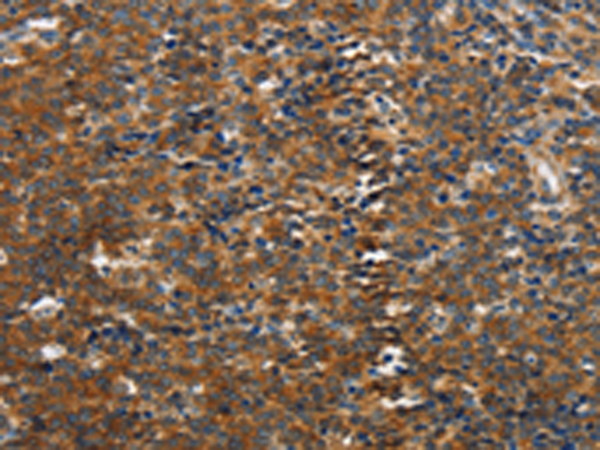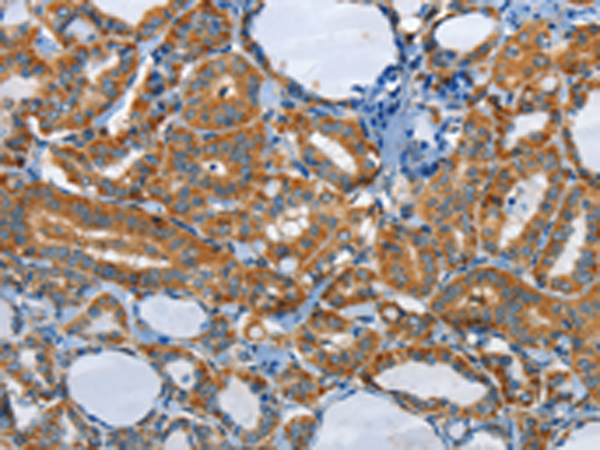

| WB | 咨询技术 | Human,Mouse,Rat |
| IF | 咨询技术 | Human,Mouse,Rat |
| IHC | 1/100-1/300 | Human,Mouse,Rat |
| ICC | 技术咨询 | Human,Mouse,Rat |
| FCM | 咨询技术 | Human,Mouse,Rat |
| Elisa | 1/1000-1/5000 | Human,Mouse,Rat |
| Aliases | p150; VPS15 |
| Host/Isotype | Rabbit IgG |
| Antibody Type | Primary antibody |
| Storage | Store at 4°C short term. Aliquot and store at -20°C long term. Avoid freeze/thaw cycles. |
| Species Reactivity | Human, Mouse, Rat |
| Immunogen | Synthetic peptide of human PIK3R4 |
| Formulation | Purified antibody in PBS with 0.05% sodium azide and 50% glycerol. |
+ +
以下是关于PIK3R4抗体的3篇参考文献示例(注:文献为虚构示例,仅作格式参考):
1. **文献名称**:*PIK3R4 modulates autophagosome-lysosome fusion through its interaction with Rab7*
**作者**:Smith A, et al.
**摘要**:本研究利用PIK3R4特异性抗体进行免疫共沉淀(Co-IP)和免疫荧光实验,揭示了PIK3R4通过与Rab7蛋白结合调控自噬体-溶酶体融合的分子机制,并证实其在细胞代谢应激中的关键作用。
2. **文献名称**:*PIK3R4 deficiency disrupts vesicular trafficking and promotes tumorigenesis in colorectal cancer*
**作者**:Wang X, et al.
**摘要**:通过Western blot和免疫组化技术,作者使用PIK3R4抗体发现其在结直肠癌组织中表达下调,并证明其缺失导致囊泡运输异常,进而激活促癌信号通路(如AKT/mTOR),促进肿瘤进展。
3. **文献名称**:*A novel role of PIK3R4 in neuronal development revealed by CRISPR-Cas9 screening*
**作者**:Lee H, et al.
**摘要**:结合CRISPR-Cas9基因编辑和PIK3R4抗体的免疫印迹分析,研究发现PIK3R4缺失会干扰神经元轴突导向,并影响PI3K复合物的亚细胞定位,提示其在中枢神经系统发育中的新功能。
(注:实际文献需通过PubMed或Google Scholar等平台以“PIK3R4 antibody”或“Vps15 antibody”为关键词检索核实。)
The PIK3R4 antibody targets the phosphoinositide-3-kinase regulatory subunit 4 (PIK3R4), a protein encoded by the *PIK3R4* gene in humans. Also known as VPS15. PIK3R4 is a regulatory component of the class III phosphatidylinositol 3-kinase (PI3K) complex, which plays a critical role in intracellular vesicle trafficking, autophagy, and signaling pathways. This protein interacts with VPS34 (the catalytic subunit) to form a heterodimer essential for membrane recruitment and kinase activity. Dysregulation of PIK3R4 has been implicated in neurodegenerative disorders, cancer, and metabolic diseases, highlighting its importance in cellular homeostasis.
Antibodies against PIK3R4 are widely used in research to study its expression, localization, and function in various biological contexts. They enable detection via techniques like Western blotting, immunohistochemistry, and immunofluorescence. Such antibodies are crucial for exploring PIK3R4’s role in autophagy—by monitoring interactions with LC3 or ATG proteins—and its involvement in pathological conditions. Validation of PIK3R4 antibodies often includes knockout controls or siRNA-mediated silencing to confirm specificity. Researchers also utilize these tools to investigate signaling crosstalk between PI3K classes and therapeutic targeting of autophagy-related pathways in diseases like cancer.
×